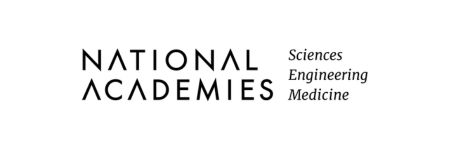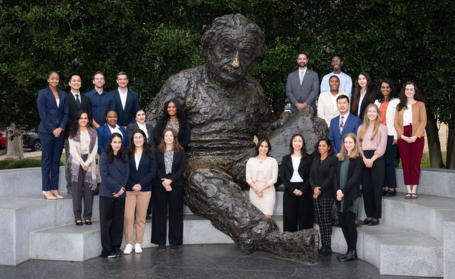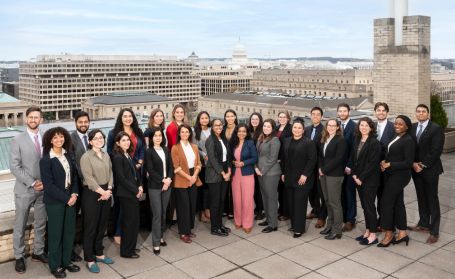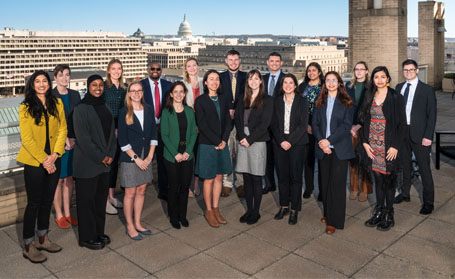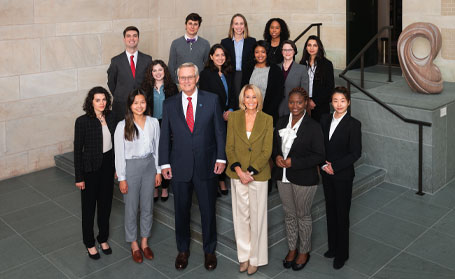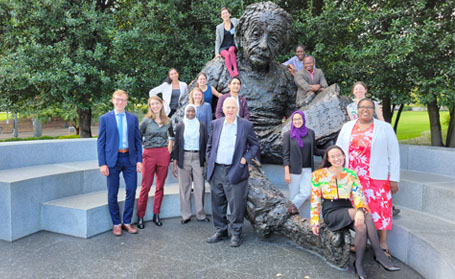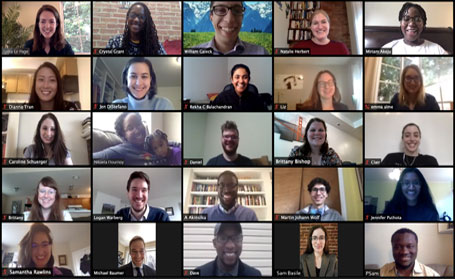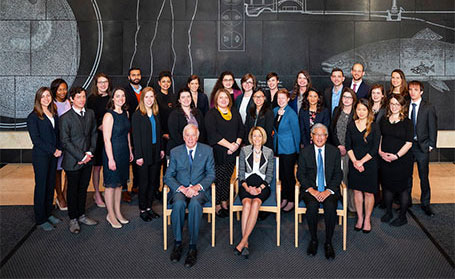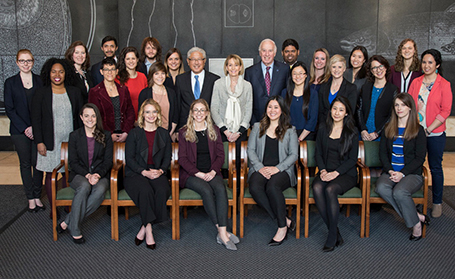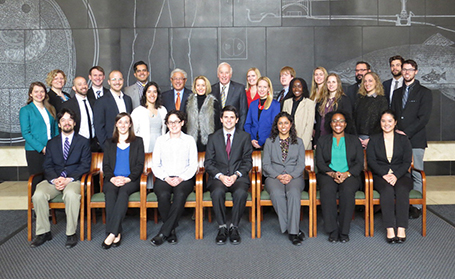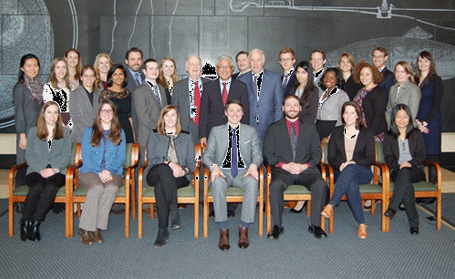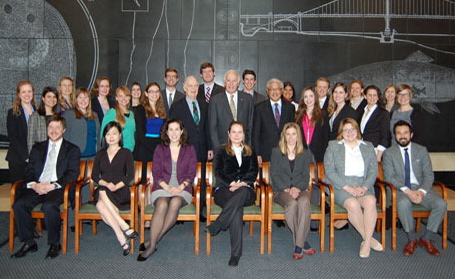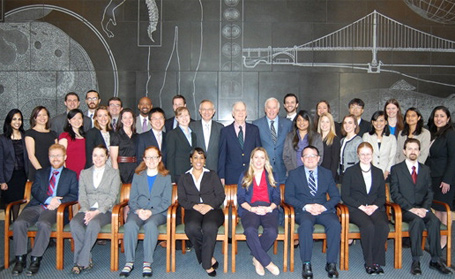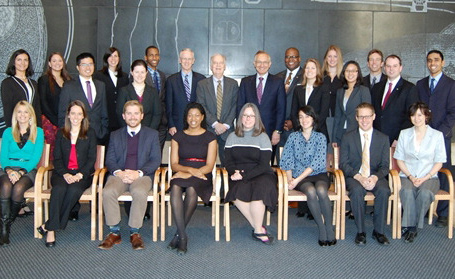The Christine Mirzayan Science and Technology
Policy Graduate Fellowship Program
The application for the 2026 Mirzayan Fellowship will open in summer 2025. Please visit our How to Apply page to learn more.
Launched in 1997, the Christine Mirzayan Science & Technology Policy Graduate Fellowship Program is a full-time, hands-on workforce training and educational program that provides early career individuals with the opportunity to spend 12 weeks at the National Academies of Sciences, Engineering, and Medicine in Washington, DC learning about science and technology policy and the role that scientists and engineers play in advising the nation.
Each year, new Mirzayan Fellows join a National Academies unit where they are assigned to a mentor and learn about the world of science and technology policy. An immersive experience, the goals of the Mirzayan Fellowship are to help Fellows:
- Deepen their understanding of science and technology policy;
- Discover new career paths that engage both science and policy communities;
- Understand the role that scientists and engineers play in advising the nation by working closely with a mentor within the National Academies;
- Expand their perception of how the science and technology ecosystem operates in Washington, DC by attending meetings and policy-related activities outside of the National Academies;
- Obtain essential skills and knowledge needed to work in science policy at the federal, state, or local levels; and
- Build a network of Fellows and program alumni who will stay connected with each other and with the Academies.
Support
-
Dr. Bruce Alberts
-
National Academy of Sciences Casey Fund
-
National Academy of Sciences Kellogg Fund
-
National Academy of Sciences Kobelt Fund
-
Water A. Rosenblith Endowment Fund
-
William and Katherine Estes Endowment Fund
-
Individual and alumni donors
Staff
If you have any questions, please contact us at MirzayanFellowship@nas.edu.
Program Details
As a full-time, hands-on program experience, the Mirzayan Fellowship brings together a broad range of activities that will expose you to activities both inside and outside of National Academies, including:
Orientation
During orientation week, you will spend the day learning about National Academies processes and build your foundational understanding of science and technology policy work.
Program Unit Work
As the centerpiece of your Fellowship experience, your program unit work will consist of a close collaboration with your assigned mentor to deepen your understanding the way your assigned unit impacts science and technology policy through their work. Your mentor will provide substantive assignments designed to provide an educational experience and opportunities to connect with committee members through meeting observation and direct introductions where possible. Examples of former Fellows' projects include:
- Outlining themes related to leading research in remote sensing applications;
- A workshop on how scientists in developing countries might take better advantage of new wireless communication networks to gain access to the Internet;
- A workshop on the ethical, legal, and societal issues associated with the emerging field of synthetic biology;
- A background paper on the state of knowledge of the demography of street-children and the cost and effectiveness of existing programs that help street-children and orphans in the U.S. and abroad;
- A concept paper exploring the status of the global research university.
Weekly Guest Speaker Series
In addition to Program Unit Work, Fellows also participate in a series of twice weekly guest speaker sessions that will expose them to senior leaders inside National Academies, bring in external experts from the D.C. policy community, and help explore future career paths.
Science and Technology Policy Assignment
During the program, Fellows will complete a group assignment designed to help them learn how to work in a group “committee” setting to write a policy memo about an issue associated with science and technology.
Networking and External Events
Networking and attendance at briefings/meetings are important parts of the Fellowship that help Fellows integrate into the D.C. policy network. Activities include:
- Fellowship Receptions
- Informational Interviews
- National Academies Activities
- External Events
Cohort Community Building Activities
Each year, a new cohort of Mirzayan Fellows joins a robust network of current and former Fellows who become valuable professional resources in their network.
Stipend and Travel Expenses
The Mirzayan Fellowship provides a stipend of $11,000 to offset living expenses during the Fellowship period. The stipend is paid out in one installment during the first week of the program. Additionally, the program covers roundtrip transportation expenses (i.e., airfare, bus fare, or mileage) for Fellows to travel from their U.S.-based residence to Washington, D.C.
Please visit our Program FAQs to learn more.
Apply Now to Join Our Next Cohort!
The application for the 2026 Mirzayan Fellowship is now open. Please review the information below for details and reach out to MirzayanFellowship@nas.edu with questions.
Key Dates:
- Application Open: June 25, 2025
- Application Close: August 20, 2025, 11:59pm EDT
- Finalist Interviews: October 2025
- Selection Notifications: November 2025
- Program Start: March 2, 2026
- Program End: May 22, 2026
The Christine Mirzayan Science and Technology Policy Graduate Fellowship Program is a full-time hands-on training and educational program that provides early career individuals with the opportunity to spend 12 weeks at the National Academies of Sciences, Engineering, and Medicine in Washington, DC learning about science and technology policy and the role that scientists and engineers play in advising the nation. This Mirzayan Fellowship offers a unique opportunity to obtain the essential skills and knowledge needed to work in science policy at the federal, state, or local levels.
The goals of the Mirzayan Fellowship are to help Fellows:
- Deepen their understanding of science and technology policy;
- Discover new career paths that engage both science and policy communities;
- Understand the role that scientists and engineers play in advising the nation by working closely with a mentor within the National Academies;
- Expand their perception of how the science and technology ecosystem operates in Washington, DC by attending meetings and policy-related activities outside of the National Academies;
- Obtain essential skills and knowledge needed to work in science policy at the federal, state, or local levels; and
- Build a network of Fellows and program alumni who will stay connected with each other and with the Academies.
Participation in the Mirzayan Fellowship provides the opportunity to:
- Explore a new career path and develop professional skills;
- Learn how scientific research gets translated into federal policy;
- Understand how the federal government operates and the role that the National Academies play through advice-making and convening activities;
- Experience Washington, D.C. firsthand and build a network of science and technology policy experts; and
- Participate in a robust cohort experience and join an active alumni community.
We are seeking early-career scientists, engineers, and medical professionals and/or late-stage graduate students with a strong interest in science and technology policy work. International students already based in the United States are encouraged to apply. We highly encourage those with strong interest but little experience in policy to apply.
The Mirzayan Fellowship is open to applicants who meet the following criteria:
- Able to attend the full 12-week program in-person in Washington, D.C. from March 2 – May 22, 2026.
- Are one of the following:
- Current graduate student pursuing a terminal degree* (e.g., Ph. D, M.D., etc.) in any discipline within the sciences, engineering, or medicine (including the social sciences). Students should be in the dissertation phase of their program (i.e., be in the late stages of their program and not be required to attend courses during the Fellowship period) in order to be eligible.; OR
- Have obtained their terminal degree* within the last five (5) years in any discipline within the sciences, engineering, or medicine (including the social sciences). Note: Applicants who exceed this limit due to caregiving leave or military service can still apply.
- Are based in the United States and do not require visa sponsorship from the National Academies in order to remain in the U.S. during the program dates.
* A terminal degree is the highest level of education or academic credential that can be achieved in a particular field or discipline. Please note that applicants with master’s degrees are generally not eligible unless the degree is considered terminal in a technical or specialized field. If you believe your master’s degree may fit this criteria, please provide a detailed explanation in the eligibility notes section of the application in order to be considered.
To apply for the Mirzayan Fellowship please fill out our online application form by following these steps:
- Set up an account on our online application platform by clicking the Register button at the top right of this page. If you have applied before, use the Login button.
- Review the 2026 Mirzayan Fellowship Application Preview document to understand the application requirements and the Mirzayan Fellowship Application and Interview Tips as you prepare your application.
- Prepare your application materials, including:
- Short Bio (maximum 250 words)
- Short CV (maximum 3 pages, PDF)
- Two references, which demonstrate how you fulfill the selection criteria outlined in the Selection Process section below. (maximum 2 pages per letter, PDF).
- Note: We recommend that current graduate students include one letter from an academic advisor who knows them well and can confirm the anticipated degree completion date.
- Statement of Interest (maximum 500 words)
- Description of Policy Issue Interest (maximum 300 words)
- Notify your referees. Provide their email address in your application as soon as possible to maximize their time to submit. Note: Mailed reference letters will not be accepted.
- Submit your application materials via our online application platform by August 20, 11:59 PM EDT. Note: All application materials must be complete and submitted via our online form to be considered.
The Mirzayan Fellowship selection process is a merit-based, open competition based on applications generated by interested individuals. After the deadline, alumni and staff readers will review all eligible applications. Following this review, semi-finalists will be considered for specific placements within the National Academies based on the information provided in their application. Prospective mentors will be invited to review applicant materials, focusing on applicants with interest in their areas of project work. Semi-finalists selected by each mentor will participate in virtual interviews with program staff and prospective mentors before final placements are made.
The following criteria will be used to evaluate eligible applications and must be addressed by your essay and/or reference letters:
- Demonstrated interest in science and technology policy;
- Strong communication skills with the ability to work collaboratively in a professional team;
- Alignment between personal/professional goals and the scope of the program;
- Ability to take a self-directed approach to networking and engagement with policy experts within and outside of the National Academies; and
- Suitability for one or more of the available mentor units.
Applicants with limited previous experience working in Washington, D.C. and/or the federal government are encouraged to apply. Candidates deviating significantly from the expected profile must demonstrate a reasonable case for consideration through their submitted application.
Please visit our Application FAQs to learn more.
Current and Past Fellows
Each year, the appointment of a Rosenblith Fellow in science, technology, and international affairs and the appointment of an Estes Fellow in the behavior and social sciences are made possible by generous support from the Water A. Rosenblith and the William and Katherine Estes Endowment Funds, respectively. Previously sponsored Fellows and activities include:Rosenblith Fellows & Activities
- Asha Sharma (2014)
- Patricia Cabezas (2015)
- Anne Dare (2016)
- Gabriel Sandler (2017)
- Courtney Hill (2018)
- Irene Cheng (2019)
- Natalie Herbert (2020)
- Rosenblith Workshop on Diplomatic Skills for Scientists (2025)
- Toyib Aremu (2025)
2012 Winter Biographical Sketches
2011 Fall Biographical Sketches
2011 Winter Biographical Sketches
2010 Fall Biographical Sketches
2010 Winter Biographical Sketches
2009 Winter Biographical Sketches
2009 Fall Biographical Sketches
2008 Fall Biographical Sketches
2008 Winter Biographical Sketches
2007 Summer Biographical Sketches
2007 Fall Biographical Sketches
2007 Winter Biographical Sketches
2006 Summer Biographical Sketches
2006 Fall Biographical Sketches
2006 Winter Biographical Sketches
2005 Summer Biographical Sketches
2005 Fall Biographical Sketches
2005 Winter Biographical Sketches
2004 Summer Biographical Sketches
2004 Fall Biographical Sketches
2004 Winter Biographical Sketches
2003 Summer Biographical Sketches
2003 Fall Biographical Sketches
2003 Winter Biographical Sketches
2002 Summer Biographical Sketches
2002 Fall Biographical Sketches
2002 Winter Biographical Sketches
2001 Summer Biographical Sketches
2001 Winter Biographical Sketches
2000 Summer Biographical Sketches
2000 Winter Biographical Sketches
1999 Biographical Sketches
1998 Biographical Sketches
1997 Biographical Sketches
Frequently Asked Questions
Program FAQs
Given recent news, is the 2026 Mirzayan Fellowship continuing as planned?
Yes, the Fellowship program is continuing in 2026 as planned. Selected Fellows will be matched based on the information provided in their applications. Should there be any changes or updates to the program, our team will communicate them promptly and directly to all Fellows and applicants as applicable.
Select the categories below for responses to frequently asked program questions.
What are the National Academies?
The National Academies of Sciences, Engineering, and Medicine work together to provide independent, objective analysis and advice to the nation and conduct other activities to solve complex problems and inform public policy decisions. The National Academy of Sciences was created in 1863 by a congressional charter approved by President Abraham Lincoln. Under this charter, the National Research Council was established in 1916, the National Academy of Engineering in 1964, and the Institute of Medicine in 1970. We are a private, non-governmental organization and do not receive direct federal appropriations for our work.
The majority of the studies carried out by the National Academies are conducted at the request of government agencies. However, many studies are privately funded. Most of our work is conducted through seven major programs. Learn more by watching this video about National Academies’ Impact and Mission.
What is the Mirzayan Fellowship?
The Christine Mirzayan Science and Technology Policy Graduate Fellowship Program (Mirzayan Fellowship) is a 12-week training and educational program taking place in Washington, D.C. at the National Academies’ Keck Center offices. It is a full-time (37.5 hours per week), hands-on training and educational experience designed to engage Fellows in the process that informs science and technology policy through a placement within one of National Academies’ program units. By participating in this program, you will develop the basic skills and know-how essential to working or participating in science policy at the federal, state, or local level.
Who was Christine Mirzayan?
Christine Mirzayan was a Fellow in the second year of the Policy Fellowship Program and was assigned to the Center for Education. She had recently finished her PhD from the University of California in San Francisco and had been selected as a 1998 American Association for the Advancement of Science (AAAS) Congressional Fellow.
At UCSF, her research focused on the development of the vertebrate nervous system. In particular, she analyzed the molecular mechanism by which diffusible cues guide the migration of developing axons. While at UCSF, she found that although she enjoyed basic research, she was increasingly interested in the role that science plays in society and looked forward to a career that would allow her to utilize her scientific knowledge to address the political and social problems facing our nation.
Tragically, she was unable to reach that goal when she lost her life during the last week of the Policy Fellowship Program. The National Academy of Sciences has renamed the program in her honor.
To learn more about Christine Mirzayan, please visit these sites:
What do Mirzayan Fellows do?
As a full-time, hands-on program experience, the Mirzayan Fellowship exposes Fellows to a broad range of activities both inside and outside of National Academies, including:
- Working closely with a mentor in your assigned program unit;
- Participating in a weekly guest speaker series;
- Completing a science and technology policy assignment;
- Networking and attending Fellowship receptions and external events; and
- Building community with other cohort members.
Does the Fellowship provide a stipend or other funding?
Yes, the Mirzayan Fellowship provides a stipend of $11,000 to offset living expenses during the Fellowship period. The stipend is paid out in one installment during the first week of the program. Additionally, the program covers roundtrip transportation expenses (i.e., airfare, bus fare, or mileage) for Fellows to travel from their U.S.-based residence to Washington, D.C. The Mirzayan Fellowship does not fund research-related activities, award scholarships, or provide financial aid assistance of any kind. Fellows are not considered employees, as they are placed within the National Academies for a short-term educational training experience.
Is the Mirzayan Fellowship an in-person or virtual program?
The Mirzayan Fellowship is an in-person program held primarily at the National Academies’ Keck Center in downtown Washington, D.C. All required Fellowship sessions (e.g., orientation, weekly guest speakers, networking receptions, etc.) will be held in-person. However, many employees of the National Academies are currently working in a hybrid setting. Therefore, you will be expected to follow the hybrid work norms of your assigned unit for all program work.
What program unit will I work with during the Fellowship?
Each Fellow will be placed with a host program unit at the National Academies. Semi-finalists will be considered for specific placements within the National Academies based on the information provided in their application. Prospective mentors will be invited to review applicant materials, focusing on applicants with interest in their areas of project work. If selected as a Fellow, you will be invited to join a specific placement as part of your offer.
Can I miss orientation or do a shortened fellowship?
No. Acceptance to the program is contingent upon attending orientation in its entirety, and Fellows must complete the full 12-week term and be available to start their fellowship on the first scheduled day of orientation. Any request for scheduled leave (personal or professional) during the term of the fellowship must be approved by program staff and the mentor host unit.
Where can I find more information about housing during the fellowship
Fellows are responsible for obtaining housing during the fellowship period. Program alumni suggest searching Craigslist, Airbnb, and Facebook Marketplace for housing opportunities. In addition, many universities in Washington, DC, Virginia, and Maryland offer suggestions for off-campus housing. Program alumni recommend visiting the Georgetown University, George Washington University, and American University websites.
A housing guide will also be sent out following selection, which will include more details and suggestions for finding short-term housing in DC.
Application FAQs
Select the categories below for responses to frequently asked application questions.
Can undergraduates apply for the Program?
No. Undergraduate students are not eligible for this program.
Can graduate students apply for the Program?
Current graduate students pursuing a terminal degree (e.g., Ph. D, M.D., etc.) in any discipline within the sciences, engineering, or medicine (including the social sciences) are eligible to apply. Students should be in the dissertation phase of their program (i.e., be in the late stages of their program and not be required to attend courses during the Fellowship period) in order to be eligible.
A terminal degree is the highest level of education or academic credential that can be achieved in a particular field or discipline. Usually, this means students pursuing a PhD, JD, MBA or MD, although this occasionally includes students pursuing another type of master's degree. Please note that applicants with master’s degrees are generally not eligible unless the degree is considered terminal in a highly technical or specialized field. If you believe your master’s degree may fit this criteria, please provide additional context in the eligibility comments section of your application to help us understand how it fulfills the requirement of being a terminal degree.
Can I apply if I've completed my terminal degree?
Yes. If you completed your graduate studies (degree awarded) within the last 5 years, you are eligible to apply.
Are the social sciences considered as a "science"?
Yes, absolutely! Social scientists are welcome and encouraged to apply.
Can law and business students in professional programs apply?
Yes. Given the importance of science and technology today, students in professional schools undoubtedly benefit from exposure to science and technology policy issues.
Can active-duty military officers apply?
Yes. However, there may be some limitations of which program units you can be placed with, and you will need to complete additional conflict of interest review steps. Please contact us at MirzayanFellowship@nas.edu so we can discuss your specific situation.
I have applied for the Mirzayan Fellowship before. Can I re-use my application?
Returning applicants are welcome to re-apply for the Fellowship but must submit a new application. Application materials do not carry over from session to session, and incomplete applications will not be considered.
How many references do I need?
Two online references are required to complete the application process. References must be relevant to your academic, professional, volunteer, or other related experience. You will not be able to submit your application until both references have been received. Mailed or emailed reference letters will not be accepted.
How will my referees be notified?
Once you complete the reference section of the application and provide your referees’ contact information, click on initiate email request, and an email will be sent to each referee. Be sure to provide your referees with as much time as possible to ensure that their reference is submitted before the application deadline.
What program unit would I be placed in if I am selected as a Fellow?
While we try to place fellows in the units that match their area of expertise, the purpose of this Fellowship is to broaden the fellow's experience and provide opportunities to explore new areas. Professionals working in science and technology policy are often called upon to apply their research skills to engaging with new scientific areas, so we encourage prospective applicants to keep an open mind about working in areas outside of their specific field of study.
Can I contact prospective program units directly?
In order to reduce the impact of unconcious bias and increase equitable access to the program, we ask that applicants please do not contact prospective program units directly. Instead, please send all application questions to mirzayanfellowship@nas.edu.
When will the prospective candidates be informed of their acceptance?
Please refer to the Key Dates section of our How to Apply page for anticipated timeframe for notifications. All candidates, regardless of selection status, will be notified when the selection process is complete.
Can international students apply?
International students based in the United States are encouraged to apply. However, you must be already based in the United States in order to be eligible. Please note that U.S.-based international Fellows must have an immigration status that allows them to attend the full duration of the program dates.
Does the Fellowship Program have a citizenship requirement?
No. However, the Fellowship does not offer visa sponsorship, so applicants who are not U.S. citizens or U.S. permanent residents must hold one of the following visas covering the full program dates:
- F-1 Students using CPT (Curricular Practical Training)
- F-1 Students using OPT (Optional Practical Training)
- J-2 Dependents
- J-1 Students using academic training
- J-1 Research Scholars with written approval of their Responsible Officer
- DACA recipients
- Adjustment Applicants, Refugees, Asylees, and Selected other visa classes
Am I eligible if I have B-1 or B-2 temporary visitor visa ?
No. We are not able to accommodate Fellows who are visiting the United States on a B-1 or B-2 temporary visitor visa.
Am I eligible if I have temporary worker status (H-1B or TN)?
No. The Mirzayan Fellowship is a fellowship award, not employment by the National Academies.
Can international students be both on assistantship and on fellowship?
The possibility of participating in the Mirzayan fellowship while maintaining an assistantship depends on the policies of your university. Based on the experiences of previous fellows, we recommend the following steps:
- Consult Your International Student Services: Verify with your International Student Services organization whether you are permitted to undertake a fellowship at another institution while retaining your departmental assistantship.
- Seek approval from Your Funding Department: Confirm with the department providing your assistantship funding that they consent to your participation in a full-time fellowship at the National Academies while you are still on assistantship.
- Check with Human Resources: Consult with the Human Resources office of your funding department to ensure they approve of your participation in a full-time fellowship at another institution while on assistantship. They may also require authorization from your department confirming that your assistantship responsibilities can be fulfilled remotely during your fellowship.
Key Dates
| Application Open | |
|---|---|
| June 25, 2025 | |
| Application Close | |
|---|---|
| August 20, 2025, 11:59pm EDT | |
| Finalist Interviews | |
|---|---|
| October 2025 | |
| Selection Notifications | |
|---|---|
| November 2025 | |
| Fellowship Start | |
|---|---|
| March 2, 2026 | |
| Fellowship End | |
|---|---|
| May 22, 2026 | |
CONTACT US
Christine Mirzayan
Science & Technology Policy
Graduate Fellowship Program
Washington, DC 20001
Email: MirzayanFellowship@nas.edu
